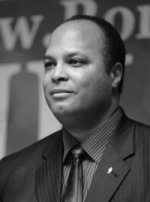 (June 24, 2009)—With the debate over health care reform heating up across the country, one sobering fact ought to give everyone pause; you can't have universal health care if you don't have enough doctors. Many press reports have focused on the shortage of physicians across the country, and the problem in southern Maryland is particularly acute, with doctor shortages in practically every medical discipline. Those shortages are projected to be severe by 2015 and the impact on health care in our region will be significant.
(June 24, 2009)—With the debate over health care reform heating up across the country, one sobering fact ought to give everyone pause; you can't have universal health care if you don't have enough doctors. Many press reports have focused on the shortage of physicians across the country, and the problem in southern Maryland is particularly acute, with doctor shortages in practically every medical discipline. Those shortages are projected to be severe by 2015 and the impact on health care in our region will be significant.
Senator Roy Dyson, the vice chairman for the Senate Committee on Education, Health & Environment Affairs, touched on this issue recently and attributed it to the burdens of student loans and low reimbursement rates from health insurance providers, including Medicare and Medicaid. While he expounded at some length on these cost factors, he neglected to mention one issue that's been a sticking point and a significant cost burden for doctors for decades - medical malpractice liability.
I'm not surprised Senator Dyson failed to bring up an issue that pits doctors against lawyers in pitched battle - it's never pretty. Lawyers believe tort reform, the solution doctors call for to deal with the medical malpractice problem, takes away the people's right to hold doctors financially accountable for their mistakes. Doctors believe most medical malpractice suits are frivolous and the awards unjustifiably inflated, and they are forced to spend time and money on multiple tests and procedures -"defensive medicine" - to avoid possible lawsuits. The fact is you cannot have a serious discussion about what is pricing doctors out of the market in southern Maryland without mentioning medical malpractice liability and tort reform - unless, like too many of our elected officials, you're a lawyer and really don't want to call attention to the issue because you have a personal stake in the status quo.
ON average, one of every five dollars a doctor makes goes toward malpractice insurance premiums, and when you add to that the need to repay student loans, the shrinking health insurance reimbursement rates, and the expense of living in southern Maryland, particularly when it comes to housing, it's no wonder we're ground zero for a critical doctor shortage in our state.
The answer to the problem is to make the medical liability process less attractive to trial lawyers and individuals looking to become rich at a doctor's expense. Legitimate claims of medical malpractice could be addressed by risk management programs where the hospital investigates claims of malpractice and, if cause is found, offers an apology and a settlement in lieu of a court battle. In most cases, the patients agree to the settlement but if they don't, they can still take the case to court. Similar patient safety programs could be established outside of the hospital structure if necessary. Either program would result in faster damage awards to patients, less litigation and a less adversarial negotiation, and more predictable outcomes that would lower risk and greatly reduce malpractice insurance premiums, or lessen the need for malpractice insurance altogether.
I'd reform the court system as well, replacing the typical trial by jury, with medical experts for hire and trial lawyers on the hunt for fat damage awards, with specialized health courts, where judges experienced in medical malpractice cases and impartial experts appointed by the court system help decide medical malpractice cases based on the evidence rather than emotion. Health courts are supported by many reputable organizations, including the Robert Wood Johnson Foundation, the Patient Coalition for Reliable Justice, and the Harvard School of Public Health, yet no state has even attempted a pilot program to determine their effectiveness.
One of the reasons that trial lawyers, in my opinion, are not the best policy makers is because they have an adversarial worldview. There is a client and a defendant and someone has to lose. That mindset is damaging in economic policy where this adversarial mentality pits one class of people against another, and it's damaging in health care reform where one side is seen as the enemy and thus has to be beaten. In matters of health policy and making it more palatable for doctors to live and work in southern Maryland, I prefer solutions that allow both patients and doctors to win. After all, the provider and recipient of care are at the nexus of the health care reform debate and their issues and concerns should inform any health care solution.
By all means, let's address issues such as loan forgiveness, insurance rates or workforce housing as ways to attract more doctors to our region. If we don't have medical malpractice liability and tort reform on the table as well, however, we're not addressing the whole problem.
Ron Miller, of Huntingtown, is a conservative blogger and activist, former and future candidate for the Maryland Senate, and communications director for the Calvert County Republican Party. Ron is a regular contributor to RegularFolksUnited.com, RedCounty.com, and ProLifeUnity.com. You can also follow Ron on his website TeamRonMiller.com, as well as Twitter and Facebook.


